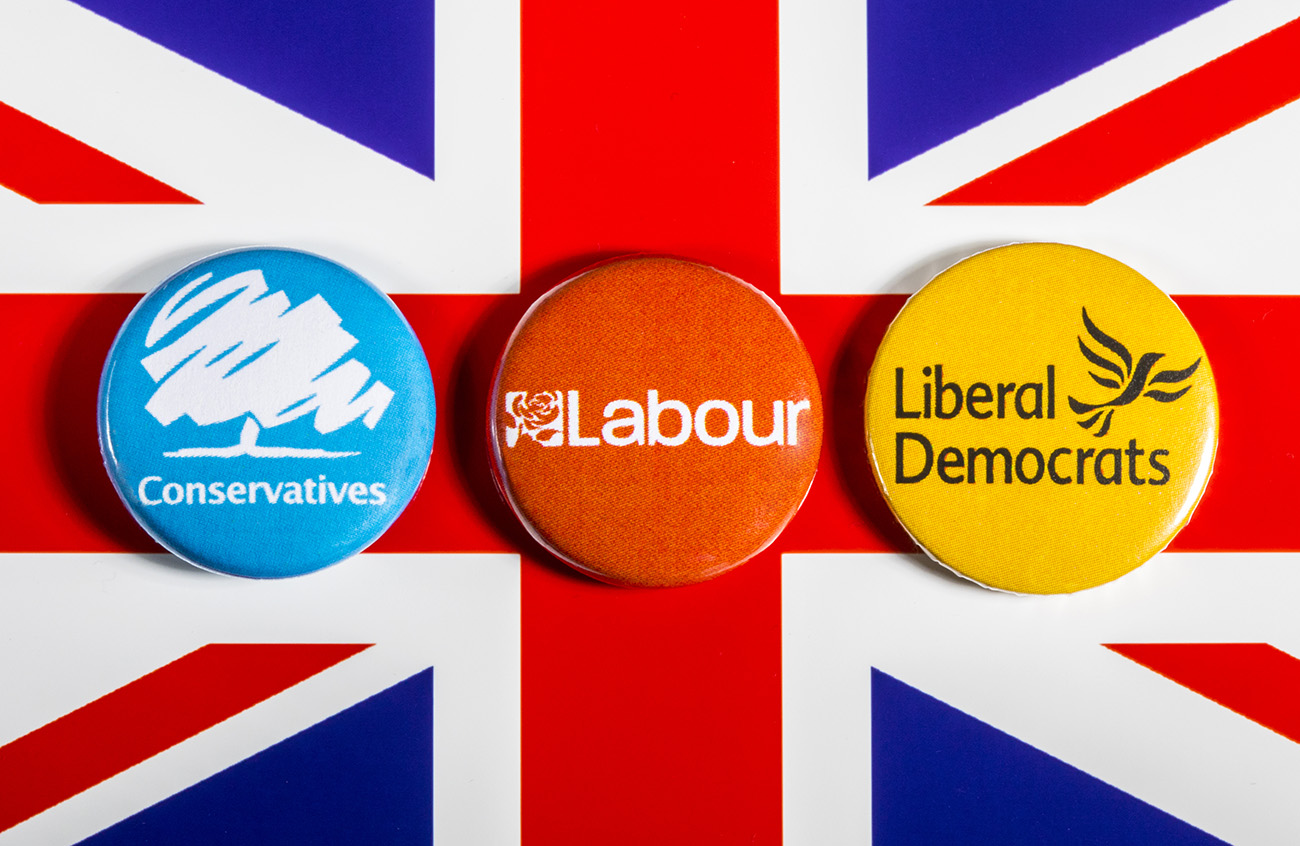Prime Minister Rishi Sunak recently announced a General Election to be held on 4th July 2024. Although Party manifestos are yet to be released, it is very likely that climate change and net zero will be high on the agendas. With this in mind, what can we expect from the three largest political parties – Conservatives, Labour, and Liberal Democrats— when it comes to energy, net zero and building commitments?
Conservative Party
After 14 years in government, the Conservative Party face an uphill struggle ahead of the July election. With the Party’s manifesto to be released shortly, details of the policies and plans remain speculative. However, the Conservative Party is likely to reinforce its ‘five priorities’.
These five priorities were announced by Prime Minister Rishi Sunak in January 2023 and cover the following areas:
Halving inflation,
Growing the economy,
Reducing debt,
Cutting waiting lists,
Stopping illegal immigration.
But what can we expect from the Conservative Party in relation to Energy, Net Zero and Buildings?
Energy and Net Zero:
Ahead of the election, the Conservative Party is expected to highlight their commitment to achieving net zero and tackling climate change.This recently announced election follows the Prime Minister’s announcement last year of a “more pragmatic, proportionate, and realistic approach” to net zero targets, wherein the Government ‘watered down’ various plans relating to net zero and climate change. This included a significant U-turn on the Minimum Energy Efficiency Standards (MEES), which required all rented properties to have an Energy Performance Certificate rating of C or above by 2028. The Prime Minister justified the amends by citing the financial burdens on landlords and the need to balance environmental goals with economic realities.Nevertheless, the Prime Minister stated in his announcement that the UK “will still meet our international commitments and hit Net Zero by 2050.”In addition to net zero, the Conservative Party is expected to highlighted its focus on improving energy efficiency and creating energy independence. This will likely be through increased investment in smart grid technology and energy storage solutions.
Buildings (New Builds and Retrofit):
In the Conservative Party’s 2019 manifesto, the Party laid out its target for “300,000 homes a year by the mid-2020s”. Although this target was later revised to be ‘advisory’, the Party has continued to emphasise housing development. In February, the Prime Minister announced plans to turbocharge city development, with thousands of new homes to be built and shops, offices and commercial buildings to be converted into homes.In addition to this, the Party is also likely to detail plans on grants and loans for retrofitting homes with better insulation and more efficient heating systems, as well as promote the use of green building standards.
Labour Party
In recent months, the Labour Party has repeatedly stated its goal to make the UK “a clean energy superpower”. With the Party’s manifesto to be released ahead of the election, Labour have reinforced their ‘first steps for change’ initiative, covering six key areas, including:
Economy,
NHS waiting times,
Boarder security,
Energy,
Antisocial behaviour,
Teaching.
So, what can we expect from the Labour Party in relation to Energy, Net Zero and Buildings?
Energy and Net Zero:
The Labour Party has announced its commitment to achieving net zero emissions by 2050. Within the Party’s ‘Make Britain a Clean Energy Superpower’ initiative, the Party states: “Ahead of the next General Election, Labour will set out more of our plans to tackle emissions in every sector of the economy to accelerate to net zero”.
In February 2024, the Labour Party famously u-turned on its pledge to make £28 billion per year of additional capital expenditure available to meet the net zero by 2050 target. However, the Labour leader, Sir Keir Starmer, advised that this revision was necessary due to high inflation and the worsening economic outlook.
Nevertheless, the Party’s ‘Green Prosperity Plan’ outlines a number of policies relating to improving energy efficiency and security, including:
Create Great British Energy, a new publicly owned clean power generation company.
Cut energy bills for families, potentially saving them up to £1,400 a year.
Create 500,000 new, skilled jobs in future industries.
Deliver energy security, reducing dependence on foreign dictators.
Buildings (New Builds and Retrofit):
Sir Keir Starmer has previously outlined the Labour Party’s plans to build more homes across the UK, as well as retrofit existing buildings to enhance energy efficiency.Within the Labour Party’s ‘Five point plan for growth’, the Party outline its ‘Getting Britain Building Again’ action point. This action point details the Party’s plan to reform planning laws “to kickstart 1.5 million new homes, transport, clean energy, and new industries in all parts of the country”.
In 2021, the Labour Party announced its aim to spend £6 billion a year on retrofitting of housing over the following decade, should they be elected into government. This was part of a wide-ranging plan to tackle climate change. However, this figure has recently been thrown into doubt, with Labour officials confirming that the Party would not spend the allotted amount until later in the parliament, and depending on rising levels of government debt.
Nevertheless, the Party has confirmed it dedication to upgrading homes across the country, with the aim of improving cold and draughty homes, cutting energy bills and creating thousands of jobs.
Liberal Democrats:
Liberal Democrats leader, Sir Ed Davey, recently launched the Party’s election campaign by stating that there is ‘no ceiling on ambitions’. With the Party’s manifesto to be released ahead of the election, the Party’s key priorities are currently outlined as:
A prosperous, innovative economy.
Fair access to good public services and a strong social safety net.
A flourishing environment with fair access to nature for all.
A strong United Kingdom and a fair international order.
A truly fair democracy, respecting everyone’s rights and empowering communities.
But what can we expect from the Liberal Democrats in relation to Energy, Net Zero and Buildings?
Energy and Net Zero:
The Liberal Democrats have announced their plans to cut greenhouse gas emissions to net zero by 2045. This is five years earlier than the current UK target. To achieve this, Sir Ed Davey outlined the Party’s plans to:
Invest significantly in renewable power, so that 80% of the UK’s electricity is generated from renewables by 2030.
Create a Net Zero Delivery Authority and promote community energy, including requiring all new homes to be fitted with solar panels.
Plant at least 60 million trees a year to help reach net zero and increase the use of sustainable wood in construction.
Give local authorities a key role to cut emissions in their own area, including more powers and funding.
Buildings (New Builds and Retrofit):
The Liberal Democrats have reiterated their pledge to build significantly more homes every year, as well as improve the living standards of current and new build homes. The Party’s plans include:
Building at least 150,000 new council and social homes every year.
Giving local authorities the power to end right to buy in their area.
Improving standards for new homes to ensure they are warm, cheap to heat and produce zero emissions.
Providing free retrofits for low-income homes and generous tax incentives for other households to reduce energy consumption, emissions, fuel bills and reliance on gas, and help to end fuel poverty.
What Happens Next? (General Election Timeline)
30th May: Parliament to be dissolved (25 working days before polling day). All seats become vacant and official government work stops (including work on consultations).
4th June: First head-to-head general election debate between Rishi Sunak and Sir Keir Starmer on ITV.
Mid June: Party manifestos expected to be released (usually 18-29 days before polling day).
17th June: Deadline for registering to vote. If you have not registered already and wish to do so, please click the following link: https://www.gov.uk/register-to-vote
18th June: Deadline for new postal vote applicants or for amending existing absent voting arrangements.
26th June: Deadline for new applications to vote by proxy.4th July: Election day/Polling day.Elmhurst will continue to update members throughout the above timeline on any new and relevant information relating to the energy assessment and retrofit sector.
Further Resources:For more information on the three largest political Party’s current policies and initiatives, please visit the websites below:
Conservatives: https://www.conservatives.com/
Labour: https://labour.org.uk/
Liberal Democrats: https://www.libdems.org.uk/
For more information on how the general election may impact current energy assessment announcements, visit our recent news page: https://www.elmhurstenergy.co.uk/blog/2024/05/23/election-impact-on-energy-assessment/
The original post can be found on the Elmhurst Energy Website

